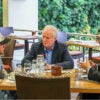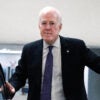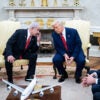Even as the leaders of two major business groups in the European Union and the U.S. met to talk about the need for further trade liberalization, the Trans-Atlantic Trade and Investment Partnership (TTIP) was mentioned only five times in President Obama and German Chancellor Angela Merkel’s joint press conference.
Blame for the lack of enthusiasm for trade liberalization rests on both sides of the Atlantic. In the U.S., President Obama’s inaction has been noticeable. Short of signaling his support through the teleprompter, the President has yet to take any real action to show he is committed to trade freedom. In fact, his negotiators caught heat from EU officials in February for their very weak initial tariff offer.
To signal his commitment to free trade, President Obama should put his money where his mouth is by expediting applications to export liquefied natural gas (LNG) from the U.S. Currently, U.S. law requires that companies apply for permits to export LNG to countries that don’t have trade agreements with the U.S. Over the past four years the Energy Department has approved only seven of 31 applications. By speeding up this process, President Obama could very easily reassure his European allies that TTIP, and bilateral trade liberalization, are at the top of his agenda. Liberalizing LNG exports would also have the added benefit of creating jobs in the U.S. and sending a signal to other countries that are dependent on Russia for natural gas.
The Daily Signal depends on the support of readers like you. Donate now
Meanwhile, recent events have revealed the relative apathy toward free trade by some members of the EU as well. Last week the French government publicly interfered in ongoing acquisition talks between General Electric and the French industrial firm Alstom. General Electric seeks to acquire the company’s energy and transport units, but French President Francois Hollande has indicated that he prefers a rival bid by Siemens, a German company, because he wishes to keep Alstom European-owned.
This type of discrimination between foreign and domestic firms certainly undermines the spirit of trade liberalization and EU dedication to a high-standard TTIP agreement. Certainly, the investment chapter of any future agreement must be airtight to prevent the U.S. or EU from discriminating against some foreign firms in any future deals.
If President Obama and EU leaders are truly dedicated to making TTIP a free trade agreement, they best shape up and focus on actions, not words and threats. Right now the distance between leaders on both sides of the table seems as wide as the Atlantic Ocean itself. And so far, neither side has been willing to get its feet wet.




























